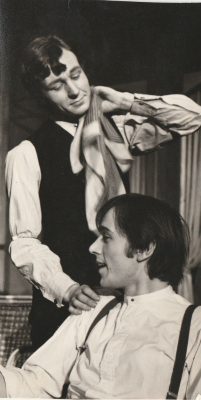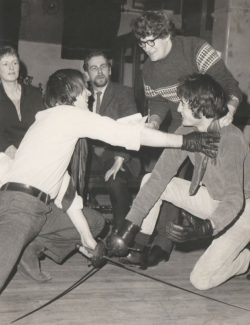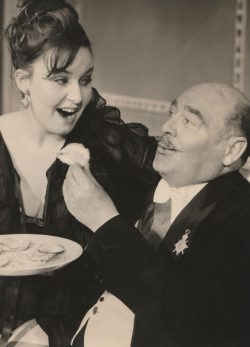 ON Saturday 16th November a group of people gathered at the Discover Church in Hinton Road, Bournemouth, for worship of a different kind.
ON Saturday 16th November a group of people gathered at the Discover Church in Hinton Road, Bournemouth, for worship of a different kind.
We were celebrating the centenary of the Bournemouth Little Theatre Club, in what was its home, the former Palace Court Theatre. Sold in 1970, when the audience had turned to television and the books would no longer balance, the Art Deco theatre, built for the club and opened in 1931, has been a cinema, bingo hall and two churches since then. Now it is in another fallow period, as necessary building works have forced hopefully temporary closure.
On Saturday, thanks to the inspired and tireless work of Eileen Rawlings, the theatre was open again to former and current members of the BLTC, which thrives in its new home in Jameson Road, Winton.
Dozens of invited guests turned up, squinting at name badges and faces to remember their old friends, as they took guided tours of the building they had loved, listened to a bright young architectural historian outline how the building had been planned, built and used, watched an excerpt from the play that won the club a huge national silver trophy back in 1938 and exchanged reminiscences of the good old days. We left, five hours later, with a dream of buying a lottery ticket, winning huge and reclaiming the theatre where so many memories had been made.
In 1919, Mr George Stone and Miss Dorothy Rowe, with Mrs Gertrude Oesterley, formed The Bournemouth Dramatic and Orchestral Club. By the mid 1950s Dorothy Rowe was still going strong. Her presence in the building was always marked. This teacher of drama and English at Talbot Heath School was one of the driving forces, insisting on an excellence of speech, delivery and movement that would be an affront to the “human rights” of the 21st century.
 Bournemouth Little Theatre Club was a heavyweight player in a town full of theatres and amateur drama groups. It was also part of the Little Theatre Movement that had started in the US as an alternative, first to the big commercial productions, and later the dominance of cinema.
Bournemouth Little Theatre Club was a heavyweight player in a town full of theatres and amateur drama groups. It was also part of the Little Theatre Movement that had started in the US as an alternative, first to the big commercial productions, and later the dominance of cinema.
Ten years after its foundation, plans were afoot to build the club’s own theatre. The 2019 guests had a fascinating glimpse at Westover Road in that period, lined not with arcaded shops but great mansions overlooking the sea and the pier. Thanks to James Weir for the comprehensive overview.
Throughout the next four decades, The Little Theatre (later known as the Palace Court Theatre) was home to scores of performers, back stage staff, directors and audiences. It gave hopeful thespians a place to learn their craft – membership was by interview, and new actors had to serve an “apprenticeship”, performing in one-act plays in the clubroom under the main stage before they could graduate to the main theatre … if they were good enough. The casting committee was held in awe.
The theatre club also provided a place of safety and acceptance for those whose lifestyles were not only marginalised but, until 1967, criminalised. The Green Room club, an Art Deco basement with bar and banquettes, was rented from the next door offices of the architects who built the theatre.
 For me, it was specially poignant to see grainy stills of the people who surrounded my childhood. My mother, Olga, had joined the club from school, and was a member when the theatre opened. Her best remembered performances were in The Little Foxes, and in When We Are Married, when she was the wife who had her ears boxed by an angry husband, and five year old me yelled from the audience “don’t hit my mummy.”
For me, it was specially poignant to see grainy stills of the people who surrounded my childhood. My mother, Olga, had joined the club from school, and was a member when the theatre opened. Her best remembered performances were in The Little Foxes, and in When We Are Married, when she was the wife who had her ears boxed by an angry husband, and five year old me yelled from the audience “don’t hit my mummy.”
There were photographs of the Scottish actress Mina Bingham (Mummy B to me), of Ronnie and June Fletcher, Dorothy Rowe in her prime.
 One of the guests at the centenary celebration was the internationally famous director and theatre academic Richard Digby Day, whose early career brought him to Bournemouth as director of the Bournemouth Theatre Company. Its four year life at the Palace Court Theatre included productions of Hamlet, Ghosts, Our Betters and Long Day’s Journey Into Night (pictured left). His company included Peter Egan, David Gilmour, Harry Waters, Geoffrey Hutchings, Annabel Leventon, Helen Weir, Alison Fiske, Ronald Pickup’s wife Lans Traverse, Dorothy Reynolds (co-writer of Salad Days) and Miriam Margolyes. We saw them perform and met them week after week before they were famous.
One of the guests at the centenary celebration was the internationally famous director and theatre academic Richard Digby Day, whose early career brought him to Bournemouth as director of the Bournemouth Theatre Company. Its four year life at the Palace Court Theatre included productions of Hamlet, Ghosts, Our Betters and Long Day’s Journey Into Night (pictured left). His company included Peter Egan, David Gilmour, Harry Waters, Geoffrey Hutchings, Annabel Leventon, Helen Weir, Alison Fiske, Ronald Pickup’s wife Lans Traverse, Dorothy Reynolds (co-writer of Salad Days) and Miriam Margolyes. We saw them perform and met them week after week before they were famous.
 The centenary celebration included an excerpt from Mystery at Greenfingers – the play commissioned by the News Chronicle newspaper (1872-1960) from JB Priestley for its National Amateur Dramatic Competition 1938-39, which was won by BLTC.
The centenary celebration included an excerpt from Mystery at Greenfingers – the play commissioned by the News Chronicle newspaper (1872-1960) from JB Priestley for its National Amateur Dramatic Competition 1938-39, which was won by BLTC.
The murder mystery, directed by Eileen Rawlings and performed by John Adams, Issy Coombes, Nadine Ellison, Matthew Ellison, Chris Huggill, Dionne Polychronopulos, Fiona Richards, Julie Sissons, Adam Stoddart and Andrea Travers, had a special ending arranged for the centenary audience, whizzing through the next scenes to the hilarious denouement.
The afternoon ended with a rendition of We Said We Wouldn’t Look Back from Salad Days, by its original 1968 performers Angela “Slippy” Taylor and John Adams, whose subsequent career has included playing the bagpipes and becoming Mayor of Bournemouth.
 But before that it was time for reminiscences from some of the guests – among them Helen Johns, the actress who could have made a triumvirate with Maggie and Judi had life been different, June Smith whose comic timing remains undiminished, Jeremy Waters and his many anecdotes and Richard Digby Day’s memories of being a professional trying to share “his” theatre with the amateurs who owned it. He paid special tribute to Gilbert Clayton, who worked so hard for the success of the venture. Richard is pictured left, standing, with Peter Egan, Geoffrey Hutchings and David Gilmour rehearsing Hamlet.
But before that it was time for reminiscences from some of the guests – among them Helen Johns, the actress who could have made a triumvirate with Maggie and Judi had life been different, June Smith whose comic timing remains undiminished, Jeremy Waters and his many anecdotes and Richard Digby Day’s memories of being a professional trying to share “his” theatre with the amateurs who owned it. He paid special tribute to Gilbert Clayton, who worked so hard for the success of the venture. Richard is pictured left, standing, with Peter Egan, Geoffrey Hutchings and David Gilmour rehearsing Hamlet.
Eileen Rawlings, whose performance as Miss Gossage in The Happiest Days of Our Lives is a cherished memory for all who saw it, worked for three years to arrange the day, which was hugely enjoyable for all who attended.
 And in this very long review, if you have read thus far, just a few of my own cherished memories.
And in this very long review, if you have read thus far, just a few of my own cherished memories.
My first play in the club room, when I was 18, was a verse drama. I don’t know what it was called or who wrote it, but I do remember my opening lines.
I am the chosen advocate of queens, whose earth-life done, await their winnowing, ere to the last great judgement hall they come.
Then there was Marie Bamber charging into the greenroom bar and demanding “a glass of beauj” from the redoubtable Bee. And the stentorian bellow of Olive Ford, generous support and help from Elsa Jacobs and the larger-than-life Eileen Dyson. Performers including Phillip Mutton, Derek Hyder, Dennis Bowden and John White, Pat Bowring, Bill Waters, Joyce Caton who founded Brownsea Island Open Air Theatre, Malcolm Stuart … so many more.
 The after-show parties where we had to wear evening dress, and Mateus Rose bottles exploded with the new-fangled gas openers.
The after-show parties where we had to wear evening dress, and Mateus Rose bottles exploded with the new-fangled gas openers.
The Green Room where Bee presided over us competing for parts, falling in love, breaking our hearts, stuffing into steak and kidney pie, watching our idols, dispensing welcome to newcomers, wondering when Dorcs would open the prop cupboard, discussing the tricks of Leichner makeup, listening to the gossip, hoping we’d be noticed by the casting committee … all that.
Thanks from everyone to Eileen and the team, and the church that so generously allowed us all to return to a magical time.
Gay Pirrie-Weir (pictured many, many years ago)